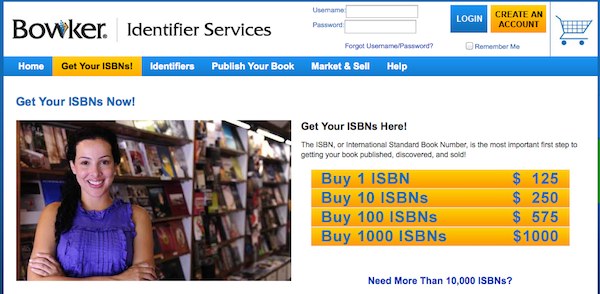If you’re an American author or publisher, and you want to publish a print edition of your book, you’ll eventually have to get an ISBN (International Standard Book Number) assigned to the title. ISBN records contain author, publisher, size, format, topic-related information, pricing, and other data needed by retailers, libraries, and book distribution systems. Some authors leave it up to their publishers or distributors such as CreateSpace and Smashwords. But others opt for the DIY route, which gives them more control over the ISBN data as well as a slight marketing edge (a self-purchased ISBN will reflect the name of the author’s publishing company or imprint). Purchasing an ISBN involves going through Bowker, an old-school publishing services company that is the sole issuer of ISBNs in the United States. Bowker was founded in the 1870s, is listed as an affiliate of ProQuest, and offers a myriad of services targeting the publishing industry. Sadly, and perhaps not surprisingly, Bowker has leveraged its monopoly power to rip off independent authors and publishers, using mercenary pricing for ISBNs and other services. The Bowker ripoff is a racket that targets new authors who are trying to get their first books in print.
How bad is the Bowker ripoff? If you’re a publisher needing lots of ISBNs, the price is $1 per ISBN — but you need to order 1,000. If, on the other hand, you only have one book and plan on releasing only one version (such as a single print-on-demand title) Bowker demands $125 — a 12,500% markup. The screenshot below from the Bowker website (I am citing Fair Use to illustrate) shows Bowker’s current pricing plans:
Actually, the markup is a lot more than 12,500%, if you consider the cost of the service. After all, it costs practically nothing when an author uses Bowker’s Web-based forms to create and store a new ISBN record. The cost structure is so inexpensive that Canada even gives away ISBNs to Canadian authors for free.
How much is Bowker making off ISBN sales to new and independent authors? The company did not respond to my March 5 email about ISBN pricing. Bowker LLC is not a public company, so there is no public annual report. However, Bowker made this claim last year:
Small presses, a category that is defined as publishers who have produced 10 or fewer books, accounted for 34,107 self-published titles — 21,256 print and 12,851 e-books — in 2011.
The number of self-published authors/small press titles probably grew in 2012, in line with growing tablet/e-reader demand, and the expansion of Amazon’s Kindle Direct Publishing program for independent authors. While not every author purchased ISBNs at $125 a pop (Bowker’s pricing scale includes more “cost effective” plans for self publishers, including 10 ISBNs for $250), Bowker nevertheless enjoyed multi-million dollar profits on the backs of new and independent authors and small publishers.
Other Bowker ripoff services
Hold on. Surely Bowker offers additional services to new authors that make it worth their while to pay $125 for a 13-digit number. Right?
Not that I can see. In fact, once an author has bought an ISBN, Bowker layers on even more mercenary upsells, like $25 barcodes and the “View Inside” widget ($120 for the first year, $60/year thereafter). Bowker claims this widget, which can be embedded on blogs or author websites, lets authors go “viral” through sharing on social networks and connecting with affiliate programs, such as Amazon Associates. Never mind that there are hundreds of free social media widgets available, and Amazon Associates has a fine selection of free widgets that authors can embed on their blogs and websites.
The Bowker ripoff aside, I could complain about other aspects of Bowker’s ISBN services, including the terrible user interface for assigning ISBNs and the bizarre request that authors upload PDFs of their books to Bowker so they can resell keyword data to their corporate customers (naturally, authors don’t get a cut). But I’ll have to leave that rant for another day.
Bottom line: Bowker is (in my humble opinion) an old-school publishing services monopoly that rips off new and naïve authors with massively overpriced digital services. I would love to see the company investigated on antitrust or unfair pricing grounds, but until that happens I can offer only a few pieces of advice to new authors:
- For your first print book, consider using free ISBNs offered by CreateSpace or Smashwords. It’s not ideal, but if sales take off you can always reissue the book using an ISBN that you purchase yourself or one that your publishing company buys.
- Self-published e-books do not require ISBNs! Amazon, iTunes, Pubit, Kobo, as well as digital content seller platforms like e-junkie and Gumroad, do not require authors to use ISBNs.
I unfortunately learned the last lesson the hard way, after using up a half-dozen overpriced ISBNs for early ebook versions of Dropbox In 30 Minutes and Google Drive & Docs In 30 Minutes. But for the latest In 30 Minutes title, Derek Slater’s Online Content Marketing In 30 Minutes, I only assigned an ISBN to the paperback edition. The Kindle, iPad, Nook, and PDF versions do not have ISBNs. As far as I can tell, ISBN-less ebooks are treated the same by Amazon and the other sales channels.
UPDATE: As of December 2015, the Bowker ripoff has gotten even worse has jacked up the price of the package specifically targeting indie authors by nearly 20%. The price of the ten ISBN package is now $295, compared to $250 in 2013.

